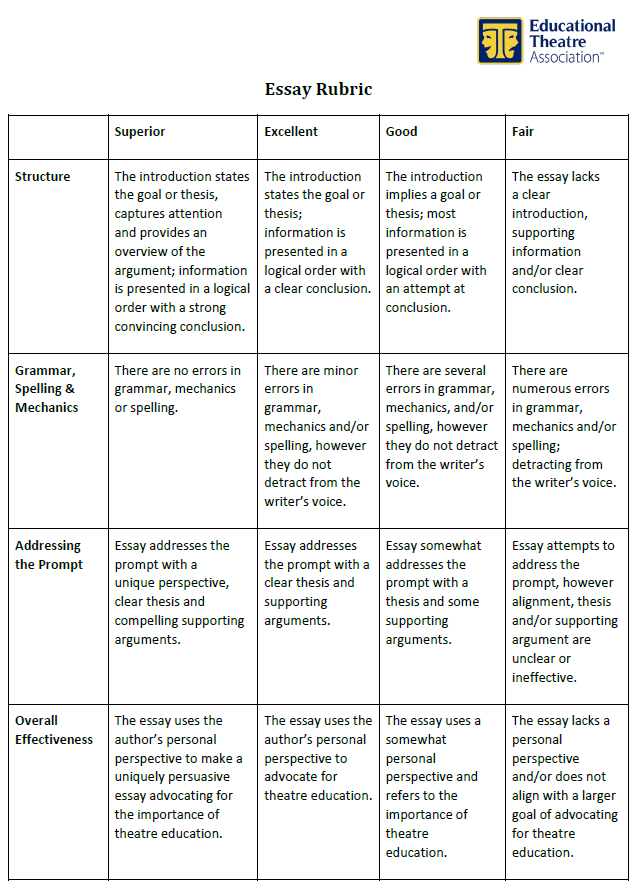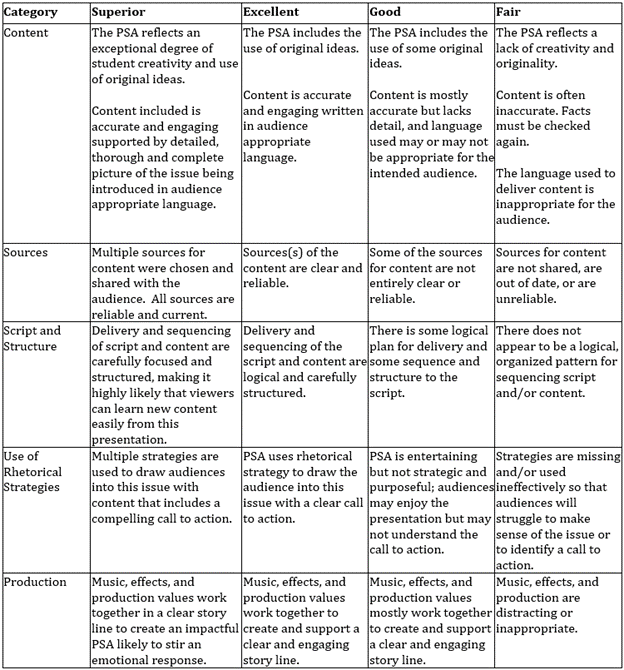
Click to Teach/Click to Learn: Become a Theatre Advocate
For this unit of instruction, students will have the opportunity to create and record their own persuasive argument for theatre education. Borrowing from skills of a theatre journalist, they will explore advocacy, write a speech and deliver it to their classmates. This unit of instruction is inspired by "What is Advocacy" at learningtogive.org. View the Learning to Give lesson plan here. This unit may be accomplished in 3-5 class periods.
Learning Goals:
- the student will learn basic advocacy skills
- the student will create and deliver an advocacy speech
Step 1: Get Inspired.
Greta Thunberg advocates for the environment in this speech to the United Nations. An inspirational example of sharing your perspective on an issue of importance to you. As you watch Greta, think about how she uses her voice, body and the power of her words to communicate her story and message.
Step 2. Learn About Advocacy
What is Advocacy? The website "Learning to Give" offers this definition:
Advocacy: (n) the act or process of writing or speaking in favor of, or supporting, a cause
FOR CLASS DISCUSSION:
What is the role of advocacy in a community or society?
How does advocacy effect change?
How does advocacy raise awareness?
Step 3: Advocacy Role Play
"Learning about issues and using our voice is a right and a civic responsibility and vital to a healthy democracy."
- Using Advocacy for Change - Learningtogive.org
Advocacy is an important part of a democratic society. Advocates are passionate about their beliefs and willing to speak about them in order to create change. You may decide to advocate because you seek a change, or you want to respond to an injustice, or to raise awareness for an important cause.
Try your hand at being an advocate using this scenario inspired by The Advocacy Game created by Jim Palmarini. You will need to download the game or have it open in another browser window to play.
How to Play
Find a learning buddy and create an improvised scene as follows:
Scenario: You are a junior in high school and you've just learned from your Theatre teacher that the spring musical will be cancelled due to budget cuts. You have requested a chance to meet with your principal to try to convince them not to cut the musical. One of you plays the principal, while the other plays the student advocate. The principal is known for making decisions based on facts and research, so if the advocate is well prepared, they may be able to change the decision.
Student advocate: Use the facts and research from "The Advocacy Game" to make your case. Be sure to follow the "Do's and Don'ts" of advocacy.
Principal: Be honest about changing your mind if the student convinces you. Keep an eye out for any "Don'ts" committed by the student advocate which may make you end the interview.
Step 4: Identify the Characteristics of an Advocate

On the Learning to Give website, we learn more about the qualities of a good advocate. Learning to Give tells us that advocates are good listeners passionate about a cause. Click on the image above or follow this link to the Learning to Give resources to download or view the "Characteristics of Advocates".
DISCUSSION: Find a learning buddy or elbow partner and discuss the sheet together. Which of the characteristics did each of you feel was the most important to become a successful advocate?
Step 5: Watch and Learn
In this video, Brannon Evans, the 2019 winner of the EdTA Democracyworks essay contest, speaks at the National Arts Action Summit in Washington, DC on March 3, 2019 as an advocate for theatre education.
Reflect on the ways in which Brannon used persuasive essay techniques to advocate:
1. How did Brannon capture the audience's interest? Why was this so effective?
2. What was Brannon's goal in writing this speech? What did she hope the audience would do?
3. How did she build her argument or make her case?
Step 6: Find Focus and Prepare to Share
Why is theatre education important to you? Asking yourself this question will help you focus in on the topic. Your goal may be to convince the audience to invest in theatre education, to save a program that has been threatened to be cut, or to convince others to sign up for theatre classes.
Next you will need to choose a specific angle for your speech. Follow the steps below to choose your theatre education advocacy topic and focus.
1. *You will need to create a 500-700 word essay. Choose one of the following prompts for your angle:
"How does theatre support your social and emotional well-being and foster a welcoming school environment?"
"How does theatre help bring diverse communities together?"
"How has theatre given you more confidence and skills?"
"Why should school districts support and fund theatre classes and/or theatre productions?"
2. Or you may wish to advocate for more access for all, with the following prompt:
"Why should theatre arts be available to all students in all schools?"
(TIP: Check out the Arts Education Data Toolkit site for statistics, especially the "Sample Message Map" for some key persuasive points.)
*If you decide to create an essay for a contest or advocacy event, you may find that you will be given a specific prompt which differs from this list, be sure to check the rules.
Step 7: Write Your First Draft

Speaking out for a cause requires the ability to build a persuasive speech. This can be broken down into some simple steps:
1- Select a topic and choose a specific angle to speak about.
2- Decide on a goal for your speech- do you want your audience to change their opinion? take action?
3- Build an argument. (here is where you need to have your facts in order)
4- Make it passionate. Believe in what you are advocating for and share a personal story that connects you to your cause.
Learn more about writing to persuade here: "6 Steps for Writing a Persuasive Speech". This will help you shape your essay.
Step 8: Refine and Build Your Argument
A big part of creating a persuasive speech is building an argument to convince your listeners of the validity of your opinion. Read "10 Skills Every Theatre Student Learns" from the Educational Theatre Association's Advocacy Toolkbox to find inspiration to help you make your case.
Which of these skills have you learned? What would you add to the list? These are great convincing points to add to your speech. Remember to write your speech as a persuasive essay of between 500 and 700 words..
Homework: Explore the Advocacy Toolbox and choose one other resource which will help you make your speech.
Step 9: Finish and Record
In this last step, you will finish your essay, then record yourself giving your speech. Be sure your essay is between 500-700 words long, and that it follows the 6 steps of persuasive speeches. You may want to share it with a learning buddy for feedback before you record. Once you have polished your speech, practice it several times in the mirror, then record yourself giving the speech either using a cell phone camera or recording your speech in a Zoom room or other video conferencing software.
Need some tips for recording? Read "Mastering Digital Auditions" on Dramatics.org
Diving Deeper
Share your voice! Talk to your theatre teacher to learn more about places you can share your message. Would you be able to speak before your school administration? Is there a community group who may be interested in hearing your story? Who might be an ally for theatre education in your area? They need to hear your message!
Want to do more? With the help of a video app or other media creation tool, create a short video commercial advocating for theatre education. Media outlets (radio, television, web news, etc.) often will broadcast a short timely message as a public service announcement (PSA), especially if it is linked with an event in support of public education. Ask your teacher to host it on your drama club or troupe social media channels to coincide with any state or local arts advocacy events in your area. If you would like to be even more elaborate, you might want to create a short documentary.
Measuring Learning
Writing an essay? Use this sample rubric to assess your learning.

Diving Deeper? Use this sample PSA RUBRIC

Classroom Connections
High School Standards
TH: Re9.1.I.c. Formulate a deeper understanding and appreciation of drama/theatre work by considering it's specific purpose or audience.
TH:Re8.1.II.b. Apply concepts from drama/theatre work for personal realization about cultural perspectives and understanding.
TH:Re9.1.III.c Compare and debate the connection between a drama/theatre work and contemporary issues that may impact audiences.
| Access Date | Quiz Result | Score | Actions |
|---|
Learning Center
- Webinars
- Adjudication Trainings
- Featured Courses
- Full Course List
- Lesson Plan Library
- Click to Teach Interactive Online Lessons
- Resources for New Theatre Teachers
- Technical Theatre Educator's Manual
- Connected Arts Networks
- Diverse Resources for Theatre Education
- Behind the Scenes Technical Theatre Curriculum
- Social & Emotional Learning
- Additional Standards Based Instructional Resources
- Search the Catalog
- Cart (0 items)
Full Site Search
Membership Benefits
Join EdTA for full access to our professional development and standards-based teaching resources, including:
- 300+ lesson plans
- Click to Teach online lessons
- K-12 curriculum
- Webinars
- And more!




